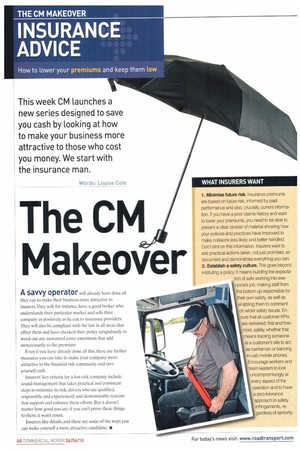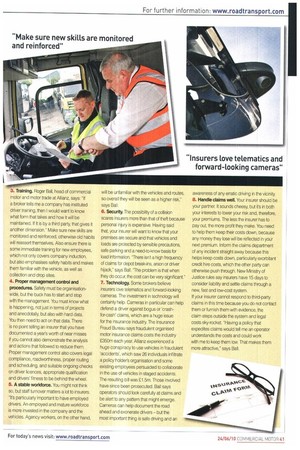WHAT INSURERS WANT 1. Minimise future risk. Insurance premiums are
Page 56

Page 57

If you've noticed an error in this article please click here to report it so we can fix it.
based on future risk, informed by past performance and also, crucially, current information. If you have a poor claims history and want to lower your premiums, you need to be able to present a clear dossier of material showing how your policies and practices have improved to make collisions less likely and better handled. Don't stint on this information. Insurers want to see practical actions taken, not just promises, so document and demonstrate everything you can.
2. Establish a safety culture. This goes beyond instituting a policy. It means building the expectation of safe working into everyone's job. making staff from the bottom up responsible for their own safety, as well as enabling them to comment on wider safety issues. Ensure that all customer KPIs are delivered, first and foremost, safely, whether that means training someone at a customer's site to act as banksman or banning in-cab mobile phones. Encourage workers and team leaders to look uncompromisingly at every aspect of the operation and to have a zero-tolerance approach to safety infringements, regardless of seniority. 3. Training. Roger Ball, head of commercial motor and motor trade at Allianz, says: "If a broker tells me a company has instituted driver training, then I would want to know what form that takes and how it will be maintained. If it is by a third party, that gives it another dimension." Make sure new skills are monitored and reinforced, otherwise old habits will reassert themselves. Also ensure there is some immediate training for new employees, which not only covers company induction, but also emphasises safety habits and makes them familiar with the vehicle, as well as collection and drop sites.
4. Proper management control and procedures. Safety must be organisationwide, but the buck has to start and stop with the management. You must know what is happening, not just in terms of projects and anecdotally, but also with hard data. You then need to act on that data. There is no point telling an insurer that you have documented a year's worth of near misses if you cannot also demonstrate the analysis and actions that followed to reduce them. Proper management control also covers legal compliance, roadworthiness, proper routing and scheduling, and suitable ongoing checks on driver licences, appropriate qualification and drivers' fitness to be behind the wheel. S. A stable workforce. You might not think so, but staff turnover matters a lot to insurers, "It's particularly important to have employed drivers. An employed and mature workforce is more invested in the company and the vehicles. Agency workers, on the other hand,
will be unfamiliar with the vehicles and routes, so overall they will be seen as a higher risk," says Ball.
6. Security. The possibility of a collision scares insurers more than that of theft because personal injury is expensive. Having said that, your insurer will want to know that your premises are secure and that vehicles and loads are protected by sensible precautions, safe parking and a need-to-know basis for load information. "There isn't a high frequency of claims for depot break-ins, arson or driver hijack," says Ball, "The problem is that when they do occur, the cost can be very significant."
7. Technology. Some brokers believe insurers love telematics and forward-looking cameras The investment in technology will certainly help. Cameras in particular can help defend a driver against bogus or 'crashfor-cash' claims, which are a huge issue for the insurance industry. The Insurance Fraud Bureau says fraudulent organised motor insurance claims costs the industry £350m each year. Allianz experienced a huge conspiracy to use vehicles in fraudulent 'accidents', which saw 26 individuals infiltrate a policy holder's organisation and some existing employees persuaded to collaborate in the use of vehicles in staged accidents. The resulting bill was £1.5m. Those involved have since been prosecuted. Ball says operators should look carefully at claims and be alert to any pattern that might emerge. Cameras can help document the road ahead and exonerate drivers — but the most important thing is safe driving and an awareness of any erratic driving in the vicinity.
8. Handle claims well Your insurer should be your partner. It sounds cheesy, but it's in both your interests to lower your risk and, therefore, your premiums. The less the insurer has to pay out, the more profit they make. You need to help them keep their costs down, because any money they lose will be reflected in your next premium. Inform the claims department of any incident straight away because this helps keep costs down, particularly exorbitant credit hire costs, which the other party can otherwise push through. New Ministry of Justice rules say insurers have 15 days to consider liability and settle claims through a new, fast and low-cost system.
If your insurer cannot respond to third-party claims in this time because you do not contact them or furnish them with evidence, the claim steps outside the system and legal costs sky-rocket. "Having a policy that expedites claims would tell me an operator understands the costs and could work with me to keep them low. That makes them more attractive," says Ball.












































































































































